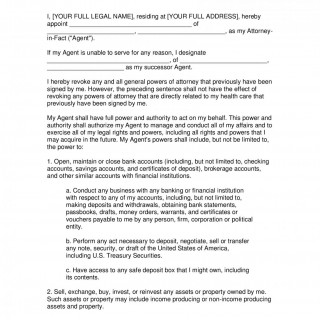Power of attorney
A power of attorney (POA) is a written document that gives another person the authority to act on your behalf. The person signing the document, or "Principal", appoints another person as an agent. The agent is also called an "attorney-in-fact", which is different than an attorney at law. A power of attorney may be oral and whether witnessed or not, will hold up in court, same as if it were in writing. For some purposes, the law requires a power of attorney to be in writing.
A Power of Attorney is a legal instrument that is used to delegate legal authority to another. The person who signs (or executes) a Power of Attorney is called the Principal. The power of Attorney gives legal authority to another person (called an Agent or Attorney-in-Fact) to make property, financial and other legal decisions for the Principal.
A Principal can give an Agent broad legal authority, or very limited authority. The Power of Attorney is frequently used to help in the event of a Principal's illness or disability, or in legal transactions where the principal cannot be present to sign necessary legal documents. It can be either for all purposes ("General") or for a specific purpose ("Special" or "Limited").
A POA can give either broad or limited powers to the attorney-in-fact. For example, a limited power of attorney might be drafted to allow a wife to sign legal documents for her husband while he is out of town. A power of attorney can also be designed to survive the incapacity or mental incompetence of the principal.
The statute confers at least the following powers to the attorney-in-fact:
- To lease, purchase, exchange, and acquire real property.
- To lease, purchase, exchange, and acquire personal property.
- To bond, share, and commodity transactions.
- To make banking transactions.
- To have access to safe deposit boxes and vaults.
- To conduct any business operating transactions.
- To exercise or perform insurance transactions.
- To do all acts necessary for maintaining the customary standard of living of the principal.
- To prepare any social security or unemployment insurance documents.
- To execute vouchers for military service benefits.
- To prepare any and all types of tax returns and documents.
- To employ agents such as legal counsel, accountants, or other professionals.
A regular power of attorney is no longer effective if the principal becomes incapacitated or mentally incompetent. In addition, powers of attorney terminate at the death of the principal. A power of attorney can also be restricted by language that the power terminates on a specific date.
A general power of attorney is very broad and provides extensive powers to the person or organization you appoint as your agent. These powers usually include:
- Handling banking transactions
- Entering safety deposit boxes
- Handling transactions involving U.S. securities
- Buying and selling property
- Purchasing life insurance
- Settling claims
- Entering into contracts
- Exercising stock rights
- Buying, managing or selling real estate
- Filing tax returns
- Handling matters related to government benefits

